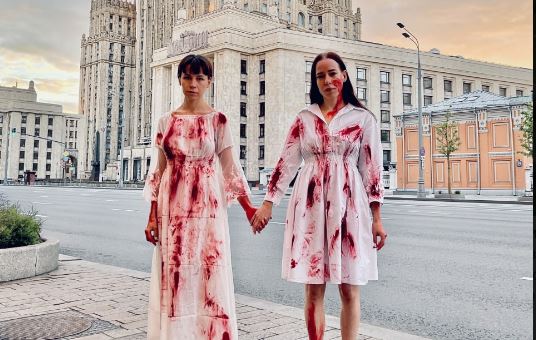For the 8 years of Russia’s full-scale invasion, the aggressor has never stepped outside the colonial paradigm, destroying Ukraine’s cultural heritage and appropriating its cultural heritage. After the large-scale invasion of February 24, Russians went even further and started “demonopolizing” Ukrainian traumas and, therefore, appropriating them to get their share of compassion. Unlike the pro-government Russian citizens advocating for Putin’s regime and its policy on Ukraine, the “liberal” ones have chosen a different route – portraying themselves as victims since Ukraine has gotten the support of the whole world and Russia has gotten nothing but neglect and condemnation. This once again demonstrates Russia’s longing for monopoly – in this case, a monopoly for sympathy.
The fight for compassion
An example of a Russian anti-war activist and volunteer, who made a tattoo with a drawing of an 11-year old Ukrainian boy raped by Russian occupiers to allegedly fix the pain of the war forever, shows that no matter how much liberal Russians disagree with the war, they perceive Ukrainian trauma as an accessory.
Convincing the West that “not all Russians are responsible for Putin’s war”, they emphasize their “bystanders’ trauma” and identify themselves through this traumatic experience. Such thesis is very helpful when it comes to shifting the responsibility for the genocide of Ukrainians to Putin and the Russian army only – and this is why Russian oppositional journalist Bozhena Rynska, when calling Russians “the new Germans”, does not forget to remind that “collective guilt does not exist, and those Russians who were going to opposition rallies and who were being persecuted for their civil position, are not to blame”.
However, the same oppositional Russians still look at Ukraine through the lens of “gentle” imperialism. Mourning the difficult destiny of Russians, Rynska worries about the future of great Russian culture, the best representatives of which Ukraine will “lure” after the victory, so Russia will lose its best oppositional journalists, opera singers, and ballet dancers. But isn’t it a vision of “better Russia”, Russia.2.0, not Ukraine? Appropriation of the colonial heritage does not seem to be the most successful decolonization strategy – and Ukrainians know that like no one else.
Liberal Russia is still imperial Russia
At this stage of the Russian-Ukrainian war, Russian public figures, who position themselves as oppositional, are playing the victims, convincing the global community (and even Ukrainians) that they are experiencing the same trauma, living in a state with a dictatorial regime, unable to influence political decisions. However, unlike Ukrainians being in the epicenter of a national tragedy, they perceive it as a theatrical performance, seeking catharsis. While Ukrainians themselves repudiate the image of “helpless victims”, doing their utmost for the victory, Russians decide to try on this role – and they are still having militaristic and violent tendencies.
Thus, Maxim Katz, a popular Russian blogger, political, and public figure, despite his condemnation of the war, still considers Ukraine part of the “Russian world” and refuses to understand why Ukrainians want to distance themselves from Russian cultural space. He describes the Russian and Ukrainian military as “the same people” put in different conditions and therefore, tries to get Ukraine back into the imperial paradigm, where people speak the same language and have the same values – and so does Russian oppositional Yuriy Dud and Alexei Navalny, criticizing Ukraine’s Revolution of Dignity and refusing to recognize Crimea as Ukrainian sovereign territory, Russian writer and journalist Yulia Latynina, supporting the idea of Ukraine being an “artificial state” and describing the Ukrainian language as “not as highly developed as Russian”, and Russian political scientist Ekaterina Schulmann, endorsing Russian “integration policy” (read: occupation policy) and calling Ukraine an “unviable state”, whatever that means – but is it an excuse to occupy another country?
The trauma and the redemption
While the whole world unites around Ukrainians, Russians mostly remain abandoned pariahs, so unwilling to associate themselves with a bloody dictatorship, they are looking for a new identity, trying to appropriate Ukraine’s trauma as a cultural phenomenon and turn it into the collective trauma of the Russian people as well, and convince the world that they also “pay the price”. However, the trauma of the audience and the trauma of the victim are different traumas by their very nature. Playing the appealing role of rebels, Russian liberals continue the same imperialist discourse in a more pleasant wrapper – after all, their discourse always leads to undermining the sovereignty of Ukraine.
Timothy Snyder, a professor of history at Yale University, clearly perceived only a total victory of Ukraine may deconstruct Russian imperialism and encourage Russian citizens to base their national idea on their future, not on their past, whatever “great” and “heroic” it may have been.
Any “compromise” in an attempt to “save Putin’s face” in this war, will finally lead to another round of Russian imperialism, which will mean another war in pursuit of glory and “for the common good”. In this case, a renewed Russian state, free of sanctions, would like to invade Ukraine sooner or later. All in all, Russia’s defeat would be not only a symbolic triumph of a former colony over a former metropole but also the defeat of Russia’s imperial war and its’ “gathering of land” politics – and therefore, a win of the whole democratic world.


